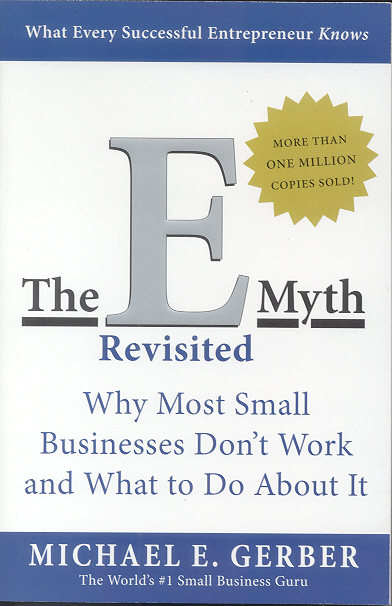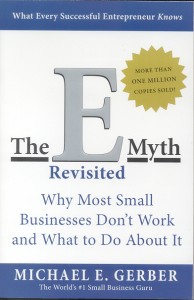This Week’s Topic: Work Within Your Business Or Work Upon It?
(Part 1 or 2)
Michael Gerber, in his wildly popular book The E-Myth, was a huge proponent of working ON the business and not merely IN it.
Here is why.
The Engine And The Fuel
Imagine the engine of a car and the fuel which powers it. The engine is capable of running consistently for long durations, it’s always there and always ready to fire up into action. On the other hand, the fuel is an expendable commodity, it’s used up drop by drop and quickly needs to be replaced and renewed.
Your business is like the relationship between the engine and fuel. The core of business is like the engine, while the various day to day operations it’s involved with are like the fuel.
The Lucky Few
An ideal scenario for anyone involved in business is to remain busy and active because continuous work is a good indicator that the business is not only operational, but also having some degree of effectiveness and meeting a particular demand.
However, learning to work less within the business and appreciating how to work upon it can mean that your business transcends to the next level of success.
It seems to be only the lucky few who work in a position they truly enjoy, waking up each morning in eager anticipation of the day ahead and returning home in the evening, satisfied by the working day that transpired.
Sure, many of us have a certain affinity for the work we’re involved with, something led us into that particular field to begin with, right? But often there’s something missing, a piece of the puzzle yet to be discovered which will introduce a newly defined clarity to the picture once it’s put in it’s rightful place.
Your Life Is More Than Just Your Business!
We’re going to cover a topic which may initially seem unconventional but, by the time you absorb all the information, you should learn to appreciate why it’s of fundamental importance. It can be summarized in one simple sentence, I just mentioned it a moment ago..
Your life is more than just your business.
Statistically speaking, over 40 percent of businesses fail in their first year of operation and it’s estimated that over one million such businesses are started up each year. That means that around 400,000 businesses fail in their primary year!
In addition to this, around 80 percent of the remaining companies shut down within the following 4 years. So we can see that the phrase “risky business” isn’t exclusive to any particular business, it can apply equally across the board!
This is why developing a realistic plan is of the utmost importance in the survival of any business. The most successful companies across the globe will tell you that without a strong plan they may have never made it at all! And luck might not fall in their favour so they would probably end up just serving to be another unfortunate statistic.
What they did was develop a plan and make it materialize into reality. They covered every intricate detail, from their company logo, to the right web address and even projected the number of additional employees they’d need to hire, year upon year.
How many McDonald’s have you visited in the past 10 years? Did you notice in all those various outlets there were many things you found familiar. The uniforms, the decor and even the food itself. There is a continuity that permeates throughout each McDonald’s store. You can order a Big Mac from a McDonald’s in America and it’ll taste exactly the same as one from a UK McDonald’s branch. Brand familiarity is something Ray Kroc, the creator of McDonald’s, aimed to achieve when he established the store all the way back in 1952.
His goal was to create a business that would function the same, wherever it was setup and regardless of who was working within it. A business, dependent on systems rather than people, could be purchased by anyone and produce identical results, irrespective of it’s setup location. He achieved this by initially using a test site to experiment with his ideas and fine tune the daily operations of the business. This is known as a franchise prototype.
At this stage you may be querying the connection between McDonald’s and your own business. Well, wouldn’t it be a strong asset for any business to be able to survive without the owner for a period of time, still producing consistent results that customers have grown to associate with that business? Of course it would!
All that’s required of you is to assume that your business is essentially a prototype and you intend to eventually establish more of exactly the same calibre, exhibiting the same flawless operation.
Follow these rules to give you the best chance of achieving this particular objective:
-
An Operations Manual will detail all the work in my model.
-
Consistent and ongoing value to suppliers, lenders, customers and employees will be inherent in my model.
-
The model will be capable of being operated by those with a low skill level.
-
It is important that the the model will demonstrate order and stability.
-
A running theme of clothing, color and facilities code will be in-built into my model.
-
Predictability of service, products and atmosphere must be contained within the model.
These guideline rules have been followed by hugely successful companies like Burger King, Pizza Hut, IBM and McDonald’s. They are an excellent method of maximizing your chances of success and boosting your profits. Remember to consider every last detail so that the business can run seamlessly without you. Analyze your business and consider how it should ideally work in order to draw clientele to you.
Whether you’ve inherited a family business or you’re starting a new business from scratch, it’s inconsequential. This method of success still applies to you whether you were there at the formation of the company or not. Know your business, know your customers and document everything so that things can be easily replicated.
If you’re aware that a particular customer prefers his order delivered at a certain time, make sure that the information isn’t something contained only within your memory. Ensure that the person dealing with orders is fully informed too.
Be certain to create a fine-tuned system which can drive you to success, regardless of who’s behind the steering wheel and once you’ve reached your destination you’ll be in a position to repeat the journey time and again with a great deal more certainty and assuredness. And a business that can repeat it’s results makes that business all the more valuable!
The next part of this series will expand upon the principles set out here further. Look out for part 2!

